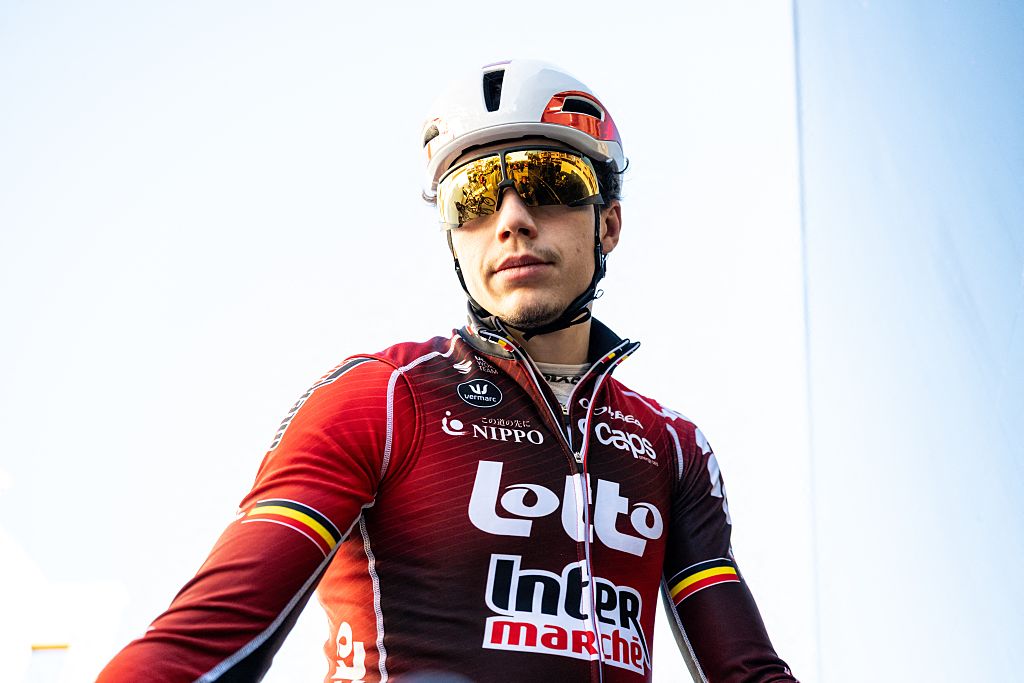The strangest presidential election in cycling history
A look back at Brian Cookson's unlikely defeat of Pat McQuaid at the 2013 UCI Congress for Cyclingnews' 25th anniversary
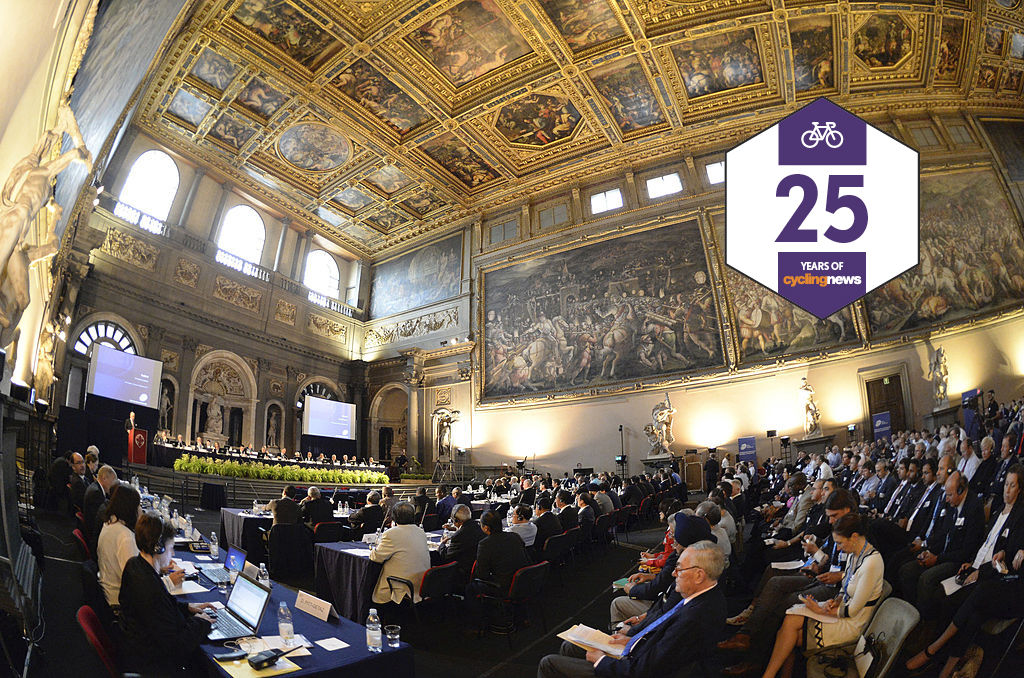
The latest race content, interviews, features, reviews and expert buying guides, direct to your inbox!
You are now subscribed
Your newsletter sign-up was successful
This year, Cyclingnews celebrates its 25th anniversary, and to mark such an important milestone, the editorial team will be publishing 25 pieces of work that look back at the sport over the last quarter of a century.
On the day the US Electoral College will finally put the victory of Joe Biden over Donald Trump in the books, Cyclingnews looks back at the most hotly contested presidential election in the history of the UCI: the 2013 contest between Pat McQuaid and Brian Cookson.
The 2013 election and the months preceding it were as contentious and ugly as anything the Americans have experienced, replete with intrigue, legal challenges, secret dossiers and allegations of Russian interference.
Normally a dull affair conducted in bland hotel ballrooms, the UCI Congress every four years brings together delegates of the various continental confederations to elect the UCI president but most times the vote is largely ceremonial, with the confederations deciding their votes in advance.
In the months and weeks before the election, candidates extensively lobby to win the votes, presenting plans and making promises but the process rarely gains much attention by the wider public.
Yet in Florence, when the UCI Congress gathered in the awe-inspiring and extraordinarily imposing Salone dei Cinquecento inside the Palazzo Vecchio, with its enormous frescoes and renaissance sculptures setting a hushed and sombre tone, the importance of the election was as equal to the scale of the setting.
The meeting was live-streamed on the internet, hundreds attended in person and several thousand viewed online. Proceedings were tense, tedious, and unexpectedly emotional - during the proceedings people hooted, hollered and applauded, and when Cookson was declared the winner the crowd erupted in cheers.
The latest race content, interviews, features, reviews and expert buying guides, direct to your inbox!
To understand why the election was so heated and the vote such a turning point, one has to look at the context of pro cycling in September 2013.
The Overlord, Twitterati and Change Cycling Now
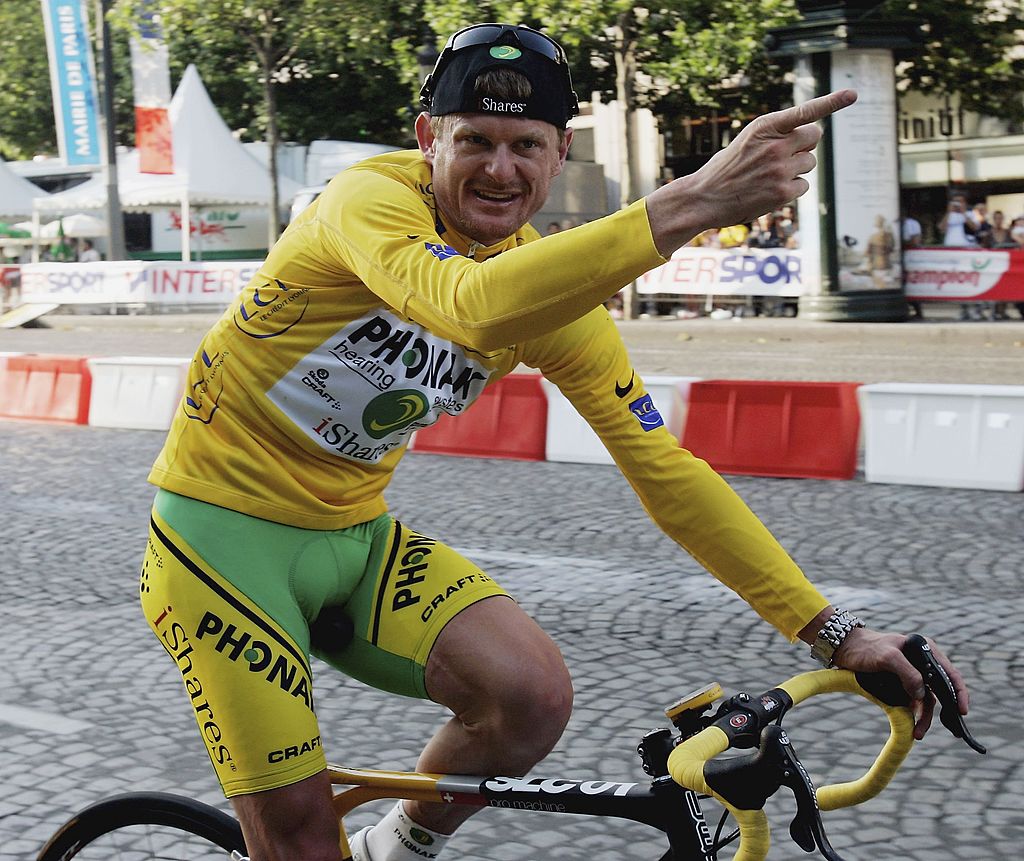
Two critical things happened in the dawn of 2013: Lance Armstrong confessed to doping throughout his career in an interview on The Oprah Winfrey Show, and the UCI tried to deny the Katusha team a WorldTour licence, making an enemy of team owner, Russian oligarch and UCI Management Committee member, Igor Makarov.
The two events might seem utterly unconnected but together they led to McQuaid's eventual undoing.
The Armstrong confession was a frayed terminus of a nefarious thread of doping in cycling that had woven its way through the sport and tied its international federation into knots since well before he came back from cancer to take his now-disqualified seven Tours de France.
McQuaid perhaps underestimated how easily internet communities on the new social media channels Twitter and Facebook could be deftly manipulated, and he stumbled straight into the burgeoning cancel culture.
In the 32 months between the time Floyd Landis went public with doping accusations against Armstrong in 2010 and Armstrong's confession - as McQuaid and his predecessor Hein Verbruggen attempted to cast Landis' allegations as a 'personal vendetta', calling Landis a 'nuisance', and 'bitter' for losing his Tour de France title in disgrace - the UCI President became the target of much ire and disrespect.
It perhaps did not help that the UCI fought USADA for jurisdiction over the Armstrong case, a move which may have been based in legitimate regulations, but the optics did little to dispel the swirling allegations of misbehaviour at the UCI. It appeared that the UCI was bullying USADA, Kimmage, and Landis, and it didn't look good.
McQuaid might have not understood that fans were not so much angry about the doping, they were riled up over Armstrong's vengeful treatment of those who dared to go against him, and saw the UCI on the side of omerta. They listened to Armstrong's victims - Betsy Andreu, Emma O'Reilly, David Walsh, among others - all of whom were finding their voices again after years of being silenced.
The internet trolls leapt into the fray, mocking McQuaid and casting him as a power-hungry bully. A cycling fan turned provocateur named Aaron Timmer Brown operated a parody Twitter account and blog as 'UCI_Overlord'. Landis, who operated a group using the Twitter handle @GreyManrod, and Brown took turns antagonizing McQuaid, Armstrong, the media and whoever else they could in an underground campaign to discredit Armstrong.
"Definitely the trolls went to town on me," McQuaid recounts to Cyclingnews.
"To be honest, I didn't know how to deal with it... I didn't think social media was going to make such a big difference. It gave guys who have opinions and who are nobodies an opportunity to have a go at me and have a go at the sport and the UCI."
The trolls had ample material to play with, from the 2010 US federal investigation into Armstrong to Tyler Hamilton's 2011 interview on 60 Minutes in which Hamilton says he saw Armstrong using EPO.
McQuaid suggests he was 'tried in the court of public opinion'.
"There were people who put out stories like Tyler Hamilton - what annoyed me about a lot of the dopers at that time was when they were caught they always blamed somebody else instead of just admitting that they doped and they got caught. People put out stories that the UCI had helped Armstrong with some doping test in the Tour de Suisse - but it never happened. But people put out these stories on social media and they mushroomed and mushroomed that whole summer."
Verbruggen and McQuaid also made a profound mistake in suing Irish journalist Paul Kimmage over statements made by Floyd Landis in a 2011 interview. For the 'Twitterati', that was the final straw.
The community came together to create a Paul Kimmage Defense Fund that grew to nearly $100,000 (more on that later) - a measure of the support that Landis had in his quest to expose the truth and a measure of the shifting opinion of Armstrong, and by association, McQuaid.
Looking back, McQuaid says that even though he had known Kimmage for decades he has no regrets launching that lawsuit.
"I didn't have a good relationship with [Kimmage] because when he wrote the book [Rough Ride, ed], he felt that everyone was against him but he spent his life fighting against people. But from the UCI point of view, I don't regret anything. All I was doing was protecting the UCI's position, its name. I had to do that. I did that during the whole eight years."
By the end of 2012, the USADA Reasoned Decision came out with 202 pages of evidence and hundreds more of appendices and supporting materials. Armstrong was banned for life.
The UCI, McQuaid says, was working within its rules and would never have been allowed to go after Armstrong the way USADA did. However, the public backlash against the UCI came with new vengeance after Armstrong's ban was announced: a lobbying group formed that called itself 'Change Cycling Now', with Kimmage, Greg LeMond, journalist David Walsh and others uniting to see McQuaid ousted.
After Armstrong's confession, the outrage of some fans came to a fevered pitch, especially at the UCI Cyclo-cross World Championships in Louisville when then-UCI President McQuaid stepped onto the stage to award the gold medal to elite men's champion Sven Nys after a particularly thrilling battle against Klaas Vantornout.
Something unforgettable happened at that moment: the crowd booed at McQuaid.
That's the situation that cycling had found itself in.
The arrival of Cookson
Brian Cookson was in Louisville as a member of the UCI Management Committee for its meeting and witnessed the spectacle of the crowd booing McQuaid and says this led to his decision to run against him in the election eight months later.
"It became clearer and clearer that things weren't as they should be. The UCI was going from crisis to crisis, Pat wasn't listening to people he should have been listening to... the reputation of the whole organisation, let alone the sport, was rock bottom," Cookson tells Cyclingnews.
"It was such an embarrassment. For me, that was a real turning point. I thought, 'something's got to change here'. I don't really want to take this on but if Pat is not going to listen - there is widespread dissatisfaction amongst colleagues on the UCI Management Committee, let alone outside in the wider cycling family."
Cookson said he never had ambitions to be UCI President and he had expressed the same to McQuaid the year before, only to change his mind.
"Nobody else wanted to do it or had the wherewithal. I had a telephone conversation with David [Lappartient], and he said it's not right for me at this stage in my career. I decided to go for it. I put my head above the parapet and got myself nominated."
His campaign was hardly spontaneous and grassroots, however, and Cookson, having earned the nomination by British Cycling, assembled an experienced and successful communications team to handle his campaign.
Nomination woes for McQuaid
McQuaid's bid to be nominated for election did not go as smoothly - or smoothly at all.
Ten weeks after his rejection in Louisville, McQuaid announced that the Irish Cycling Federation had endorsed his nomination to stand for re-election, a necessary step as the UCI Constitution states that candidates must be nominated by their national federation.
Kimmage told Cyclingnews at the time, "They voted for Ireland and they've fucked cycling. ... McQuaid is back in now and no one will stand against him. It's all going to happen again, and again, with no accountability. No one [in authority] paid the price for Festina, no one will pay the price for Armstrong."
But McQuaid had become such a hot potato that Cycling Ireland board vice-president Anthony Moran, the only one to dissent in the endorsement, resigned after that vote and called on the Irish clubs to call an Extraordinary General Meeting in order to reverse the nomination. The clubs overturned the vote 91 to 74.
The move forced McQuaid to find another federation to back him, and the obvious choice was Swiss Cycling, since McQuaid had been living there since 2005. But the Swiss weren't completely in favour of endorsing him either.
By July, McQuaid had secured support from Malaysia and endorsements from Thailand and Morocco but in August, when Swiss Cycling formally withdrew its nomination, the validity of his candidacy came into question.
McQuaid's nomination was up in the air until the vote in Florence, but it ended up being a moot point because the tide of public opinion had turned so sharply against him, mainly because of Lance Armstrong and how the UCI responded to his case over the previous three years - but the seeds of doubt had been sown long before.
Positive work undone by Armstrong's legacy
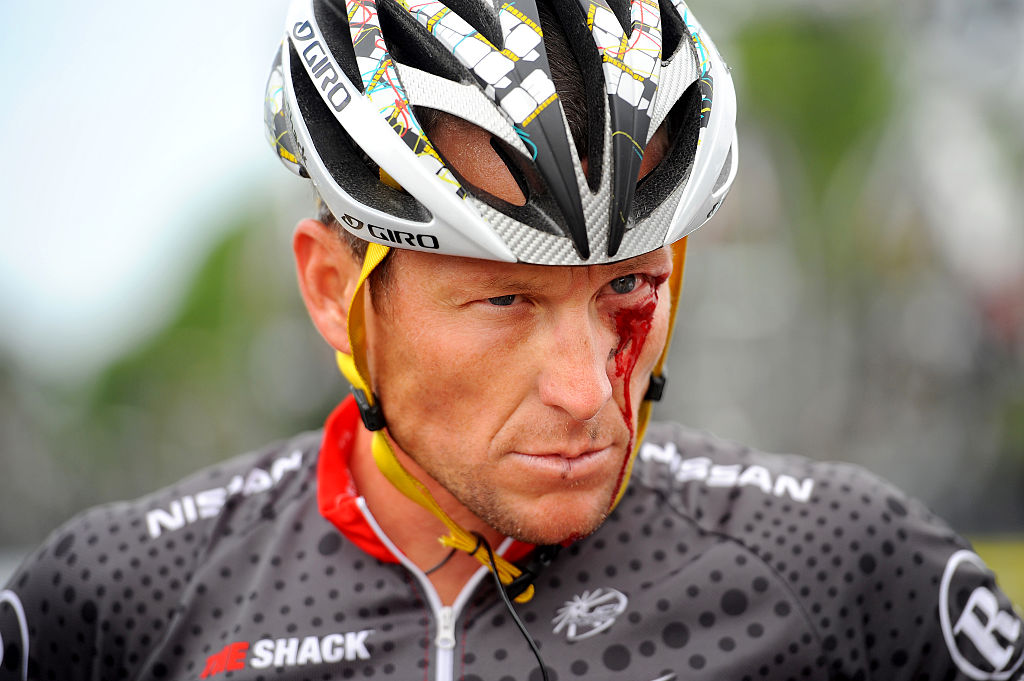
McQuaid took office in 2005 with a legacy of rampant doping under Hein Verbruggen's tenure. Blood boosting drug technologies like EPO turned what had been a bar brawl into nuclear war: so effective was EPO at improving performance that no clean rider could find lasting success as the governing body utterly failed to contain its unbridled abuse in the mid- to late-1990s.
If cycling had a chance at cleaning up its act, it would have been after the 1998 Tour de France when the use of these supercharged doping methods came so clearly to light with the Festina Affair. So serious was that scandal that it led to the creation of the World Anti-Doping Agency.
By numerous accounts, riders were ready to de-escalate in 1999 until a supercharged Armstrong came back and decimated the Tour de France, and doping spiraled out of control again. Even with 'omerta', the secrets were thinly veiled and the 2004 publication of "L.A. Confidentiel" by Walsh and French journalist Pierre Ballester, lifted the lid a crack with the first major allegations against Armstrong.
After Armstrong retired following the 2005 Tour de France, the echoes of his doping legacy continued to ripple through the sport: if there had been a post-Festina truce, during and after Armstrong's retirement, it was a free-for-all.
McQuaid inherited an organisation that was lagging far behind the evolution of blood doping, even with tests for EPO, riders turned to micro-dosing and transfusions and other more subtle methods but announced a 'zero-tolerance' policy and brought in Anne Gripper to head up the UCI's anti-doping unit.
In 2008, the UCI introduced the biological passport and created a new, more independent anti-doping wing, the CADF. But at the same time, a war with Grand Tour organisers over the ProTour had escalated to a tipping point.
The ASO yanked the Tour de France from the ProTour in 2008, holding the race under the sanctioning of the French federation, not the UCI, and the ProTour imploded. The French also took charge of the anti-doping controls and managed to snag Riccardo Ricco - and a few months later, Leonardo Piepoli and Stefan Schumacher - with a new test for CERA -the second generation version of EPO.
By September, McQuaid had managed to forge an unexpected peace agreement with the ASO to reboot the ProTour as the WorldTour. The victory could have been a major turning point for McQuaid, but in the same week, Armstrong announced his return to professional cycling.
Had Armstrong not come out of retirement, Landis might never have alerted authorities of his doping, USADA may never have undergone its extensive investigation, Armstrong would never have confessed, and McQuaid might still be UCI President.
Instead, the crowds in Louisville booed at him.
2013, Cookson, Makarov and the dossier
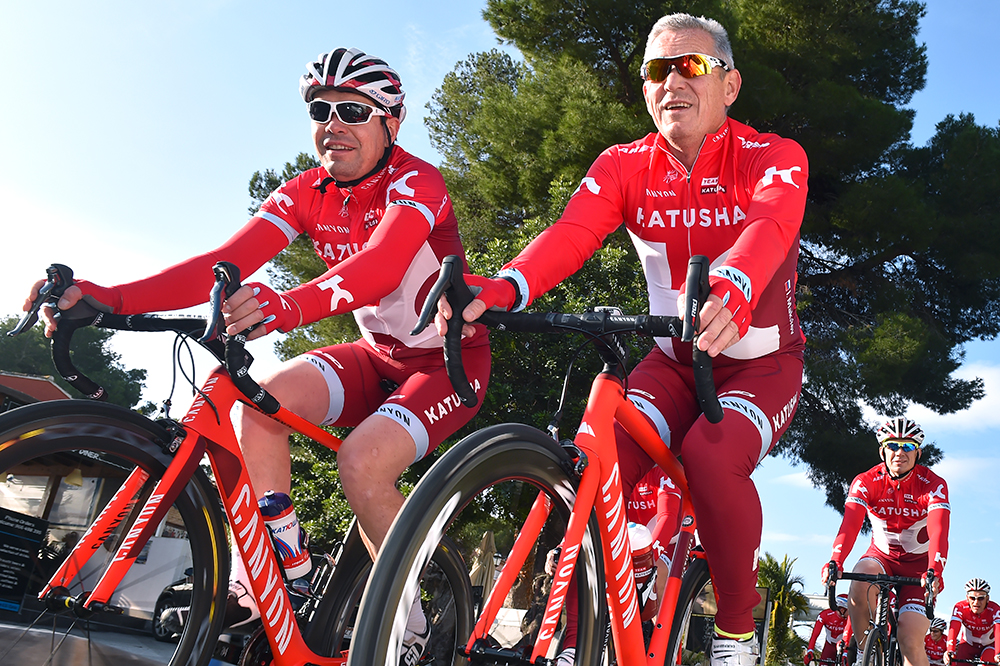
The pressures of the battle with the ASO and Armstrong allegations got to McQuaid in 2012, and the Irishman considered not standing for re-election.
McQuaid thought about returning to consulting with races and signed a contract with Makarov to help develop cycling in Makarov's home country of Turkmenistan, including preparing a bid for the 2017 Road World Championships.
But, after a successful 2012 Olympic Games, McQuaid said he changed his mind and decided to run for re-election after all, and informed Makarov he wished to not go forward with the work.
The contract, a clear conflict of interest, only came to light years later but it highlights the strong influence of the rich and powerful Russian oligarch in cycling's government.
By the end of 2012, McQuaid's relationship with UCI Management Committee member and Makarov soured when the Licence Commission recommended that Katusha not be allowed into the WorldTour. The team had to take their fight to CAS - and they won.
Not only did Katusha win, the CAS ruled that the License Commission decision was "grossly disproportionate" and forced the UCI to reinstate the team to the WorldTour and the Tour de France, where Joaquim Rodriguez later landed on the podium in third.
All was relatively quiet around McQuaid's re-election bid until the June Management Committee meeting approached and Cookson announced his candidacy. McQuaid perhaps played his hand too quickly, sending a letter to the national federations saying, "I fear Mr Cookson may be a pawn in a larger game" and pointing to Makarov's anger about the Katusha license decision.
Mike Plant, the US Management Committee member, reportedly produced a dossier of evidence against McQuaid at the June meeting and withdrew his support of McQuaid. Makarov later admitted to commissioning the 'research' with several unnamed individuals, using "two well-renowned and independent investigators".
Some of the details of the dossier accusing McQuaid and Verbruggen were leaked just before the election, but Cookson tells Cyclingnews, "there was no unequivocal link proving any criminal or inappropriate behaviour, there were just things like odd companies being formed. There was lots of smoke but nobody could say where the fire was actually coming from. It contributed to that feeling of - 'there's something fishy going on, what's all this about?'. Clearly, Pat had got close to Makarov and then things hadn't worked out for whatever reason."
The whisper campaign was effective, and between the June and September UCI meetings, more and more public opinion swung in Cookson's favour but McQuaid would not give up. "It was suggested to him that it would be better if he resigned, and he wouldn't, so we had to have an election," Cookson says.
Election Day
The UCI Congress took place during the Worlds inside the Palazzo Vecchio in Florence amid Renaissance art and architecture in this important, historical seat of power. A few days before the election, Cyclingnews sat down for brunch in the courtyard of a boutique hotel with Makarov, who said it would be "devastating" for cycling if McQuaid was re-elected.
On election day, the media accreditation given for the race earned myself and Stephen Farrand entry to a special press section at the back of the Salone dei Cinquecento, behind a temporary dividing panel - the well-heeled dignitaries shielded from our prying questions.
I found a seat on a pew along the back wall next to someone who looked vaguely familiar. A glance at his badge revealed it was none other than Aaron Brown, who earlier in the year, vanished a significant portion of the Paul Kimmage Defence Fund and was the subject of a new class-action lawsuit. There was an incredibly awkward moment in which I might have made a snarky remark about the fund and Brown's role as 'UCI Overlord'.
The meeting began, and a long, involved, extremely tedious but important argument over the validity of a proposed amendment to the UCI Constitution that would allow an incumbent UCI President to automatically stand for re-election.
The decision would have been key for McQuaid, as Ireland and Switzerland had refused to back his nomination, and it was unclear if the support from Morocco and Thailand was sufficient.
Back and forth the arguments went, around and around, with allegations from both sides swirling.
"It was really uncomfortable for everybody," Cookson recalls. "The atmosphere was really bad and poisonous. It went on and on and on. People were really getting upset. Not at the least because there was only one toilet in the whole of the auditorium.
"It was well after what the programmed lunchtime was, and we were getting nowhere. ... Finally, I stood up and asked Artur Lopez for the microphone. I said, 'Colleagues, friends, we've had enough of this. I'm going to propose that we go straight to the vote between the two candidates'."
The marble columns and figures on the vast frescoes even sighed in relief as the meeting went to a vote. When the ballots were counted and the tally read out in French, those who understood erupted in cheers - after the translation, the rest who now comprehended joined them, and Cookson delivered his victory speech.
"There was this massive sense of relief. It's difficult because it's a secret ballot and you never know whether people who promised to vote for you are actually going to do. That certainly was the case four years later (when Cookson lost to David Lappartient). At that point, I thought I had got the majority but it would be quite close.
"We got to the vote, I got a slight nod from the observer from my side who was observing the counting, so I got a pretty good idea that I'd won. Then it was announced that Mr McQuaid had 18 votes and I had 24.
"It was still close when you think three votes less for me would be three more for Mr McQuaid and it would have been a draw. It was an interesting time."
McQuaid, red-faced but composed, quickly accepted his fate and had to conduct the rest of the meeting.
"I was disappointed to lose," McQuaid says now. "I wanted to do another four years. I felt I had done a lot over eight years - particularly in the last four years. In the first couple of years I was doing a lot of firefighting between ASO and doping scandals. But then I put a lot of work with others to try and improve the UCI's anti-doping fight and we achieved that. The passport was in and functioning well. It definitely was a game-changer for sport and it changed a lot of attitudes and peoples' approach to the sport.
"I was disappointed for plans that I had and wasn't going to be able to follow through on."
Now it was Cookson's time to make plans and live a hectic life as UCI president for four years.
"It was one of the most momentous days of my life. My life changed quite considerably for the following four years," Cookson says with hindsight.
In one of his most important moves, Cookson launched the Cycling Independent Reform Commission (CIRC), which issued its full report in 2015, effectively clearing McQuaid and Verbruggen of corruption, even if it did acknowledge unequal treatment between cycling's stars and lesser riders.
The CIRC, Cookson says, "looked at specific allegations and controversies around Lance Armstrong and his acolytes - I think it was a pretty accurate record of that.
"Most importantly it had 30-odd recommendations to prevent that recurring in the future.
"In my time, we implemented I think all of those - at least all the big, important ones about the independence and impartiality of the CADF and the testing procedures, the disciplinary procedures for doping being outside the UCI President's and Management Committee's control, and all of those things we did."
The one recommendation that did not change, however, was to make the election "more transparent, democratic, representative and straightforward, perhaps to include voting rights for representatives of professional licence holders."
Cookson unexpectedly lost his own re-election bid to Lappartient in 2017.
"I never in my wildest dreams thought I would lose so comprehensively. Ouch. It's politics, and it can be a brutal game. It's disappointing and hurtful that people have told you one thing and done something else - but that's politics."

Laura Weislo has been with Cyclingnews since 2006 after making a switch from a career in science. As Managing Editor, she coordinates coverage for North American events and global news. As former elite-level road racer who dabbled in cyclo-cross and track, Laura has a passion for all three disciplines. When not working she likes to go camping and explore lesser traveled roads, paths and gravel tracks. Laura specialises in covering doping, anti-doping, UCI governance and performing data analysis.
